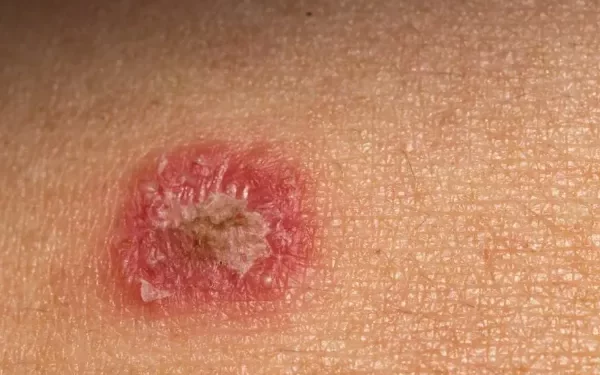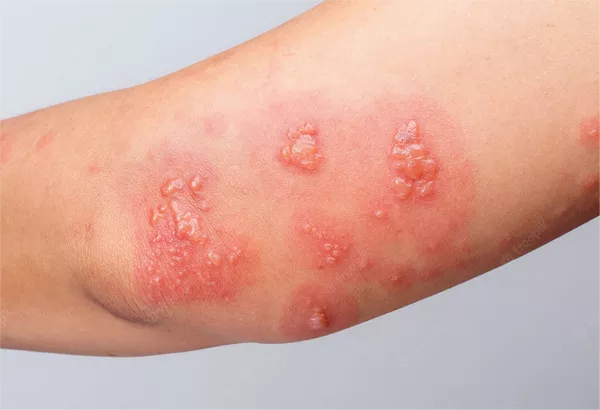Ringworm is a common fungal infection that affects the skin. It can cause a variety of symptoms, with itching being one of the most typical signs. However, not everyone with ringworm experiences itching. If you’re dealing with ringworm and notice that it’s not itchy, you might be wondering why this is the case. In this article, we’ll explore why some people don’t experience itching with ringworm, and we’ll also discuss other important aspects of this condition, including how to manage it.
What Is Ringworm?
Ringworm is a fungal infection that gets its name from the ring-shaped, red, and scaly rash it often produces. It is caused by fungi known as dermatophytes, which thrive in warm, moist environments. Despite its name, ringworm has nothing to do with worms. It can affect various parts of the body, including the scalp, feet, groin, nails, and body. Common types of ringworm include athlete’s foot, jock itch, and tinea corporis, which affects the skin on the body.
Symptoms of Ringworm
The symptoms of ringworm can vary depending on where the infection occurs, but they typically include:
- Red, scaly, and circular patches on the skin.
- The affected area may appear slightly raised, and the center might be clear or less red.
- There may be hair loss if the scalp is involved.
- The skin may feel dry and flaky.
While itching is common with ringworm, some people do not experience this symptom. This can be confusing, as itching is often one of the most noticeable signs of fungal infections. So why might your ringworm not itch?
Why Is My Ringworm Not Itchy?
There are several reasons why ringworm may not cause itching. Let’s explore some of the possible explanations:
1. The Severity of the Infection
The severity of the ringworm infection can influence whether or not it itches. In the early stages of infection, the fungus may only be affecting the outer layers of the skin. This may not cause immediate irritation, and the body might not react as intensely as it would in a more advanced infection. As the infection progresses and spreads deeper into the skin, itching may develop. If the infection is mild, it might not trigger the same inflammatory response that causes itching.
2. Your Immune System Response
Your immune system plays a crucial role in how your body reacts to infections. Some people have immune systems that are better able to control the fungal infection without causing significant inflammation. When the immune system is able to manage the infection more effectively, there may be less irritation and fewer symptoms, including itching. For some, the body’s immune response to ringworm might be mild, leading to no noticeable itching.
3. Type of Fungal Infection
Different types of fungi can cause ringworm, and not all fungi trigger the same reaction in the body. Some strains of dermatophytes are less likely to cause intense itching than others. If your ringworm infection is caused by a less aggressive strain of fungus, it may not lead to the typical itching sensation that is commonly associated with ringworm. Additionally, the location of the infection can affect whether or not you experience itching. For example, ringworm on the scalp may not itch as much as on other areas of the body.
4. Skin Sensitivity
Everyone’s skin is different. Some people have more sensitive skin, while others may have skin that is less reactive to fungal infections. If you have less sensitive skin, you may not experience the typical itching that many others do when they have ringworm. This doesn’t mean that the infection isn’t present or that it won’t spread. It just means your skin is reacting differently.
5. Effective Treatment
If you’re treating your ringworm with antifungal medications, it’s possible that the treatment is preventing symptoms like itching from developing. Antifungal creams, ointments, or oral medications work to eliminate the fungus, which may reduce inflammation and irritation. If you’re seeing improvement in your symptoms, it could explain why your ringworm isn’t itchy anymore. The treatment is effectively reducing the fungal load on your skin and helping to prevent the itching that often comes with the infection.
6. Chronic Ringworm
If you’ve had ringworm in the past and it has become a recurring or chronic condition, the immune system might have adapted to the presence of the fungus. Chronic infections can sometimes be less itchy because the body has developed a kind of tolerance to the infection. While the infection may still cause other symptoms, such as skin discoloration or dryness, the immune response may not trigger the same level of itching as it would in a new, acute infection.
7. The Location of the Infection
Where the ringworm is located on your body can also influence whether or not it itches. Ringworm on areas like the scalp or the feet may cause less itching compared to areas like the body or groin. The skin in different areas of the body can react differently to fungal infections. For example, the skin on the feet is often thicker and less sensitive than the skin on your face or groin, which may lead to less itching in certain areas.
When to Seek Medical Attention
Even if your ringworm isn’t itchy, it’s important to keep an eye on the infection. If the ringworm persists, spreads, or doesn’t seem to improve with over-the-counter treatments, you should seek medical attention. A healthcare provider can help diagnose the condition and recommend the appropriate treatment. They may also investigate whether there are other underlying skin conditions contributing to the problem.
How to Treat Ringworm
While ringworm may not always be itchy, it’s still important to treat it to prevent it from spreading or worsening. Here are some treatment options:
1. Over-the-Counter Antifungal Creams
The most common treatment for ringworm is antifungal creams or ointments. These can be found over the counter at most pharmacies. Common antifungal medications include clotrimazole, miconazole, and terbinafine. These creams are applied directly to the affected area and work to kill the fungus. It’s important to follow the instructions on the label and continue using the cream for the full duration of the treatment, even if the symptoms improve.
2. Oral Antifungal Medications
For more severe or widespread cases of ringworm, your doctor may prescribe oral antifungal medications. These medications, such as terbinafine or itraconazole, work from the inside out to eliminate the infection. They are typically used when topical treatments are ineffective or when the infection has spread to other areas, such as the scalp or nails.
3. Keeping the Area Clean and Dry
Fungi thrive in warm, moist environments. To prevent the spread of ringworm, it’s important to keep the affected area clean and dry. Wash the area gently with soap and water, and pat it dry with a clean towel. Avoid scratching or picking at the rash, as this can spread the infection to other areas of your body or to other people.
4. Preventing Spreading the Infection
Ringworm is contagious, so it’s important to take steps to prevent spreading the infection. Wash your hands frequently, avoid sharing personal items like towels, clothing, or hairbrushes, and disinfect surfaces that may have come into contact with the infection.
Conclusion
Ringworm is a common fungal infection that typically causes itching, but not everyone experiences this symptom. The severity of the infection, the type of fungus, your immune system response, and the location of the infection all play a role in whether or not itching occurs. If your ringworm isn’t itchy, it doesn’t mean that you don’t need treatment. It’s still important to treat the infection to prevent it from spreading and worsening. With proper care and treatment, you can manage ringworm effectively and get back to healthy, clear skin. If the infection persists or spreads, be sure to consult with a healthcare provider.
Related topics


























